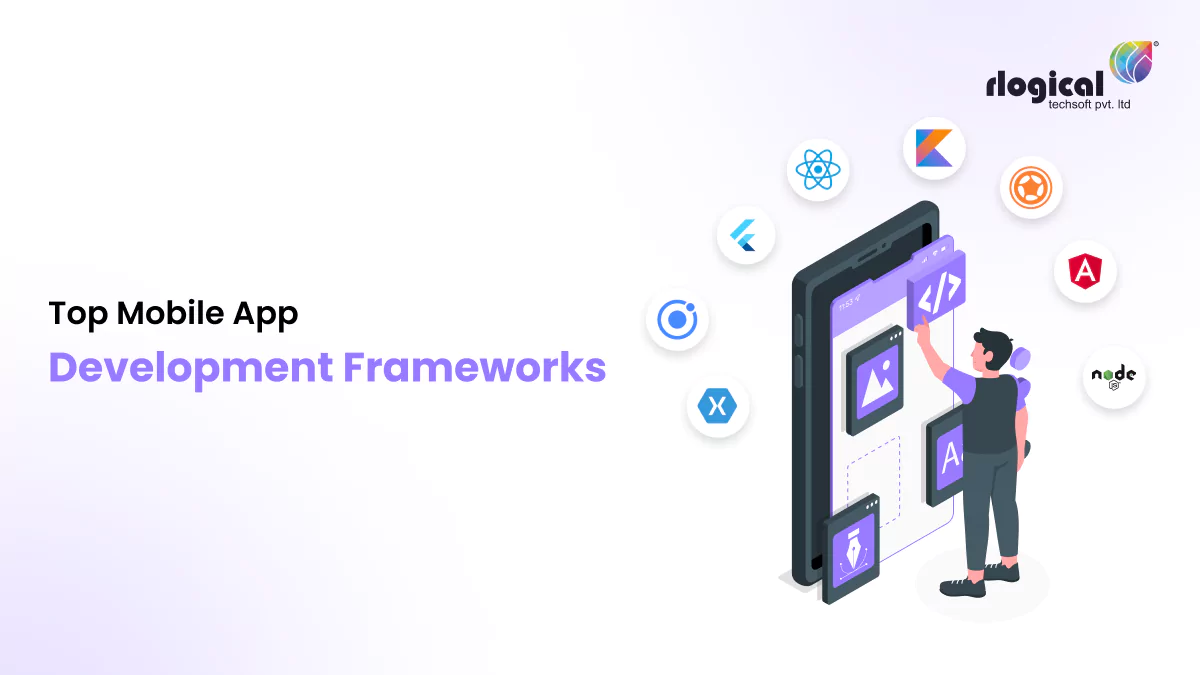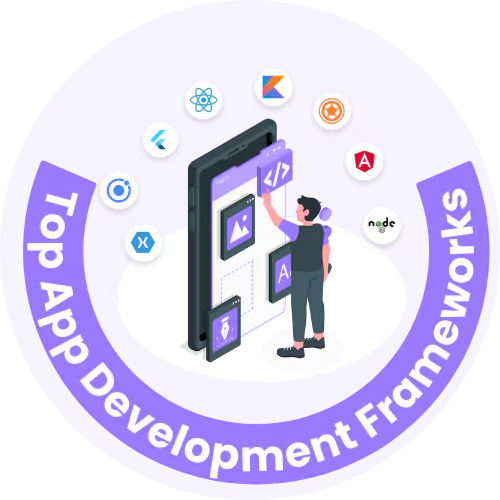
Quick Overview: To create robust and attractive mobile apps, you need the assistance of top mobile app development frameworks. Such frameworks are the pre-built components and use the existing development cycle. It will enhance your app performance and features making it a more user-centric product. Unleash the article containing the best frameworks for mobile app development!
For scaling in the fast-growing market you have to make powerful mobile applications. Accordingly, the requirement for experienced mobile app development teams is increasing. As the recent generation is dependent on gadgets (mobile phones), showing your business on their screen becomes even more important.
You can hire mobile app developers through an outsourcing model. It will be proven cost-saving and deliver quality applications that align with your business needs. However, you have to do your pre-planning. By researching and analyzing the market and user demands, you can frame a proper app development strategy.
Remember that the features of powerful applications drive the best user experiences and set them apart. So, the following latest frameworks for mobile app development will take you to the next level and stay ahead of the curve.
What Are The Best Mobile App Development Frameworks in 2025?
An app development process demands versatile processes with the latest technologies. Here’s the list of the best frameworks for mobile app development. Using any of these frameworks will empower your application functionality.
-
Flutter
Flutter is the most extensively popular and Google-developed framework, the best UI toolkit. It enables the creation of visually pleasing, native-like apps for various operating systems using a single code base. It uses Dart programming language to deliver applications for Android and iOS. This open-source mobile application SDK uses interactive widgets to create a responsive device-friendly user experience.
The grouped under Flutter’s widgets provide variations and eliminate the need for platform-specific UI elements. Moreover, Skia, a 2D rendering engine is of great help for developers. It allows developers to create a truly innovative experience, and customize based on clients’ needs. All-in-all you can integrate Flutter SDK in your Full-Stack app development technologies. It will ensure a faster development process.
-
React Native
From its launch in 2015, React Native, an application development framework based on JavaScript, was released by Facebook. It is anticipated to be one of the most popular mobile frameworks for developing applications for multiple platforms.
React Native enables developers to create feature-rich mobile applications. Users can experience the native look and feel for both desktop and mobile devices. It gives the product its widespread appeal and efficient user interface. React offers platform-independent features mapped to the native platform’s UI and API access.
Moreover, it allows start-ups to remain competitive in the market. You can build cross-platform applications with cost-efficiency, time-saving approaches, and code reusability.
-
Ionic
It is a framework built with Apache Cordova and Angular. Iconic is a free and HTML5-based solution that creates mobile apps smoothly. The mobile applications are robust and feature-rich applications with high-end app performance. From list views, navigation menus, filters, action sheets, and UI elements, you explore various solutions. It can be integrated with the iOS framework to strengthen the app’s design.
Ionic is the best mobile application development framework for your next project. It combines HTML5-based user interface development with native features to deliver better solutions. Thus, If you have an eye for advanced functionality, you can go for it.
-
Xamarin
Microsoft’s Xamarin is a mobile app-based, open-source product. Using a reliable browser that supports programming languages like .Net and C#. The mobile applications created with Xamarin offer end users a one-of-a-kind experience thanks to their flexible and innovative performance.
Developers use Xamarin to construct an ecosystem with a background, components, etc. In addition to that, you can get an easy development process by integrating a variety of tools, and programming languages in Xamarin. You can also use cloud services on various devices.
Xamarin is a platform that offers the best backend infrastructure for your application. It produces fewer-to-no bugs and speeds up development. Additionally, it has an app store with UI controls to make it easier to develop for various platforms. With cross-stage libraries and additional outsider items accessible. So, you can record a profound connection between different gadgets.
-
Kotlin
This Java Virtual Machine (JVM) is the foundation aspect of the modern Android app development framework. It is a core programming language used for making Android apps. The introduction of Kotlin has specifically focused on Android developers. The majority of Java’s classes and syntax are supported in it. Additionally, Kotlin has extensions that simplify working with Android resources and JSON.
Indeed, Kotlin is a great choice for creating Android apps using a modern language. Kotlin’s interoperability with Java is a crucial feature for the mobile app development process.
-
Corona SDK
The Corona SDK is an excellent cross-platform, free, open-source framework. You can develop desktop games and mobile apps for smart TVs, mobile devices, and other platforms. Corona SDK is the top choice for graphics and animation.
It is the fastest development framework and a high-performance multimedia development tool. You can get the benefits of OpenGL hardware acceleration, flexibility, and ease of use. So, Corona is unrivaled in its capacity to create apps written in a lightweight scripting language and runs on a Lua-based framework.
-
Node JS
The server-side platform Node.js is excellent for creating scalable and effective applications. It is a completely versatile and shortcoming open-minded design that scales well with the development of your business. It is an excellent choice for creating mobile applications that share data with other sources.
Node is the top-notch platform for creating rich, user-friendly applications. Using the Node JS platform lets you create apps that are both scalable and effective. Hence, it is an excellent choice for creating mobile applications that share data with other sources.
-
Angular
Lastly, but the most reigning one is Angular. It is an open-source framework champion. The server-side Model View Controller (MVC) model is a front-end-oriented version of this framework. It is one of the most widely used frameworks for creating applications with just one page.
Well, the most significant advantage of Angular is its extensive ecosystem of third-party libraries and its stunning design. You can create apps with efficient design layouts. Additionally, it has a lot of documentation to show you how to use it effectively.
Select the Best Mobile Development Framework Right Away!
When you have partnered with a mobile app development company, it can help businesses grow to new heights. For that, you need to implement frameworks like Flutter, React Native, Xamarin, and others. These make your app gain a competitive edge and are feature-rich.
Our clients have used frameworks that have proven profitable to capture wider customers. Selecting the appropriate mobile framework is a must-have for a booming mobile app. Your business-specific app will comply with industry standards and provide an appealing app. With the right app development team, you can make a remarkable app. Get into the talk with our experts.
FAQs
Why integrate frameworks in your mobile app development?
Well, the primary need for integrating new-age and fast frameworks in your mobile app development is minimizing developers’ efforts. The following reasons make the use of frameworks an essential aspect.
- Fast development time
- Edge of code reusability
- Compatible with various platforms
- Improves the performance
- Streamlined maintenance
- Reduces cost
- Enhance with UI components
Which is the most used app development framework?
Among all the above, Flutter is the most broadly used mobile framework today. It has been considered by a few big companies such as Google Ads, BMW, and other apps built with Flutter.
Which mobile frameworks are best for iOS app development?
Aside from the above-mentioned mobile app development frameworks, there are a few specifically for iOS applications.
- SwiftUI
- Alamofire
- Swiftic
What frameworks to use for Android mobile app development?
Flutter, Ionic, and React Native are already elaborated for mobile app usage. Below are some of the frameworks you can consider for Android app development.
- Apache Cordova
- Android SDK
- Kotlin
- Adobe PhoneGap
How to choose the ideal Framework for your mobile application?
To choose the best frameworks for mobile app development, you need to evaluate some factors which are as follows;
- Features and functionality of the app
- Platform-specific needs
- Support the third-party libraries
- Requirement of UI Toolkit
- Type of mobile app
- Alignment with major tech stack, etc.
Rahul Panchal
Rahul Panchal is the Founder & Managing Director at Rlogical Techsoft Pvt. Ltd. He is a pioneer tech enthusiast who has assisted diverse enterprise solutions with a fresh perspective over the years. From integrating technologies like Full-Stack, .NET, Flutter & PHP, he has harnessed custom web or hybrid mobile app development projects. His creative outlook on the latest models of AI, ML, blockchain, and IoT, has made various businesses attain leading-edge success.
Related Blog
- Progressive Web App Development Cost: Accurate Figures Guide
- Top Hybrid App Development Frameworks to Capture 2025 Trends For Your Business
- How Much Does MVP Cost: Factors Influence MVP Development Budget & its Reduction Tips
- Progressive Web App Benefits for Your Business Growth in Future Market
- Flutter for Web App Development: The Cross-Platform Companion For Your Business
Categories
- All
- AI Development Services
- Amazon Web Services (AWS)
- ASP.Net Development
- Azure Web App
- Big Data Analytic
- Customize
- Digital Marketing
- Drupal Development
- E-commerce web development
- Education Mobile App Development
- Enterprise Application
- Event Management App Development
- Fintech
- Fitness App Development
- Food Delievery
- Front-End Development
- Grocery App Development
- Healthcare App Development
- Hire Dedicated Developers
- Hotel Booking App
- IT Industry
- JavaScript Development
- Mobile App Development
- On Demand App Development
- On Demand Healthcare App Development
- PHP Development
- POS Software Development
- Real Estate Mobile App Development
- Retail Business App Development
- Salesforce
- Social Media Development
- Software Development
- Technology
- Transportation App Development
- UI/UX Design
- Web Design
- Web Development
- Web Services
- Web/Data Scraping Services
- WordPress




 Rahul Panchal in Mobile App Development
Rahul Panchal in Mobile App Development 





